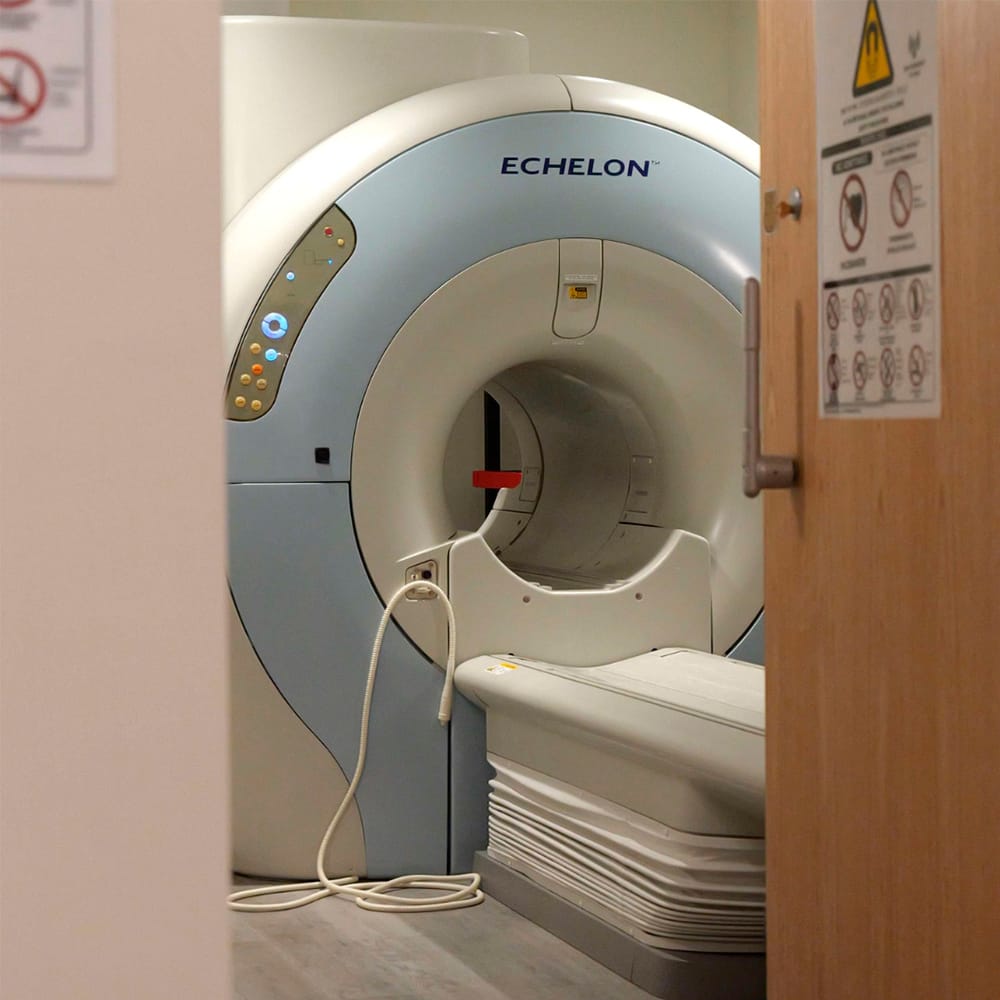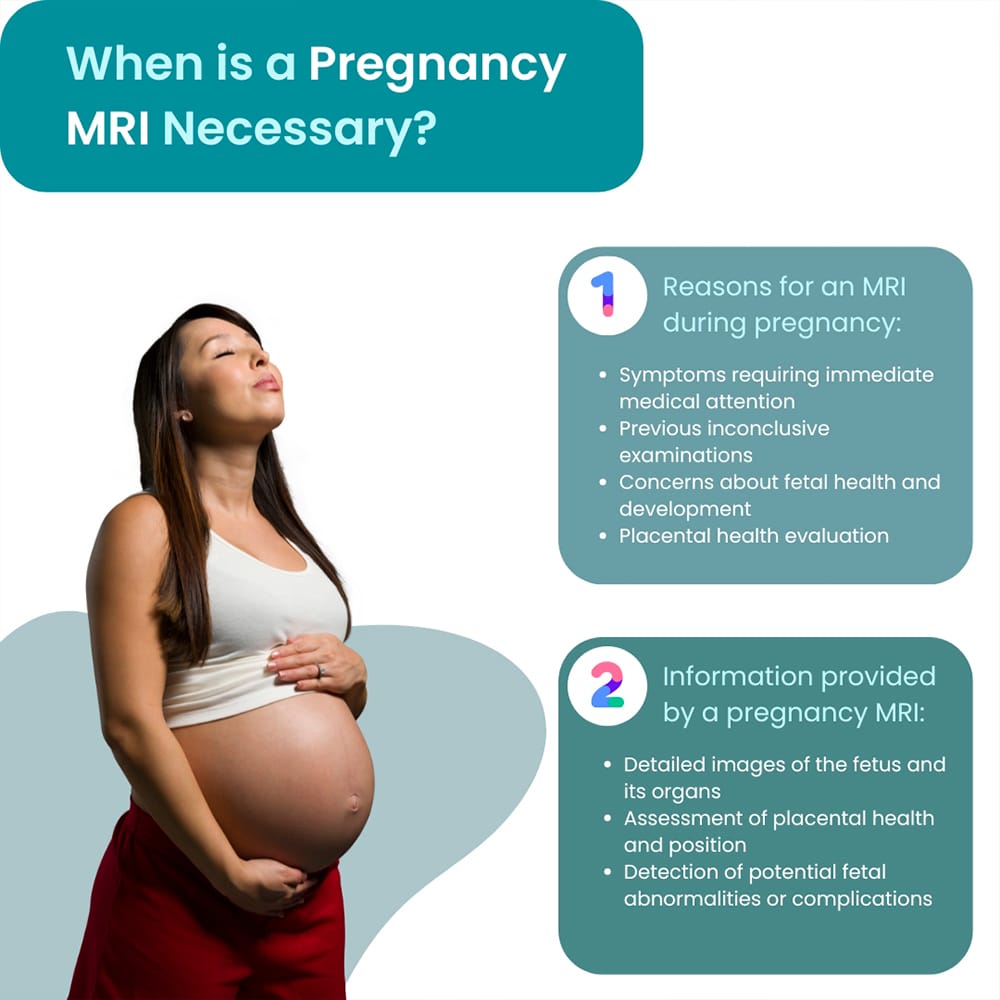 During pregnancy, nothing is more important to a mother than her baby’s health. A healthy pregnancy also depends on a healthy mother. If you are an expectant mother and have symptoms that require treatment or exam results that need clarification, but cannot wait until after the delivery of your baby, your doctor may recommend an MRI.
During pregnancy, nothing is more important to a mother than her baby’s health. A healthy pregnancy also depends on a healthy mother. If you are an expectant mother and have symptoms that require treatment or exam results that need clarification, but cannot wait until after the delivery of your baby, your doctor may recommend an MRI.
Because of the clear, excellent images MRI produces, it is an extremely useful tool in the diagnosis and treatment of problems in a pregnant mother or health concerns within the fetus.
Magnetic resonance imaging (MRI) is a safe and non-invasive diagnostic procedure that creates images of your internal organs, structures, and other soft tissues that help your doctor diagnose diseases or conditions. It uses a powerful magnetic field combined with radiofrequency pulses and a computer to assemble a detailed image of the body part being examined.
If you become ill during pregnancy, both you and your unborn child become patients. Before starting the treatment, your doctor may ask for an MRI to determine your medical needs and health conditions affecting you and your baby.
Your doctor may order an MRI if you are experiencing symptoms that require medical treatment or you have had an examination before, but the results are not clear enough on their own. An MRI during pregnancy means that your doctor feels that the symptoms you are reporting are serious enough to require treatment before the birth of your baby, or they want to rule out some medical condition to ensure your and the baby’s wellbeing.
An MRI creates images of a pregnancy and provide the information your healthcare provider is looking for. It offers a view of the placenta, the organ that grows in the uterus during pregnancy, and crucial information about the developing fetus and organs in the fetus, like the brain, lungs, and abdomen.

MRI does not use ionizing radiation like X-ray or CT scans, which makes it the safest diagnostic tool during pregnancy. It is not expected to cause any tissue damage. MRI in pregnant patients is appropriate when the benefits outweigh the risks as assessed by a radiologist.
Also, there are no proven risks to pregnant women or unborn babies from MRI exams. MRI is safe imaging for most people, including pregnant women. Risk typically depends on the patient’s specific medical condition. Over the last few decades, thousands of pregnant women have had MRI exams, and no known harmful effects to the baby were found.
There is no reason you should refuse an MRI exam during pregnancy if it is necessary for diagnosing your potentially serious or urgent illness due to fear of risk. The most significant factor in having a healthy baby is ensuring a healthy mother. The baby depends on the mother to stay well and carry her pregnancy to term.
MRI is a straightforward procedure, but it may require some preparation when it is performed during pregnancy. It is essential to follow any instructions provided by your doctor for accurate results.
Inform your doctor if you have metal implants or devices from a previous surgery, such as:
Some of these can cause you harm or get damaged if they are put into the strong magnetic field of the MRI machine. If you have metal in your body that was not disclosed before your appointment, your test may be delayed, rescheduled, or canceled until further information is obtained.
There is no recovery time after MRI or special care unless you are not feeling well or have a condition that is affecting your health. Make sure to get up slowly and carefully from the table to avoid dizziness or lightheadedness from lying down for some time to prevent any harm to you or the baby.
If you were given contrast dye for the scanning or you took anti-anxiety medication, you may be monitored for reactions and side effects before you can go home. Let the radiologist staff know if you feel nausea, vomiting, itching, hives, or any unusual symptoms.
You can return to your normal diet, activity, and medication. Call your doctor if you experience any reactions after reaching home.
Once the scanning is complete, a radiologist will go through the images, interpret them, and prepare a report. They will share the report with your referring doctor, who will discuss the results with you. You can also request a copy of the images on a CD ROM for your record.
Depending on the results, your doctor may call you for further discussion and to plan the next step for your care.
An MRI during pregnancy can ensure the safety and health of the expectant mother as well as the unborn baby. Knowing what happens during an MRI and how to prepare for it can make the process less stressful. It also helps you go through it easily and enables your doctor to identify your condition accurately as soon as possible to prevent any harm to you and the baby.
Has your doctor ordered an MRI while you are pregnant? Call Manhattan MRI today to schedule an appointment for your test. If you have any concerns regarding your condition, talk to our specialists to learn more about MRI and its safety in pregnancy. They will explain why they have ordered the procedure and how it will help them examine your body better and care for you and your child.
Don’t delay your diagnosis – Dial 123-546-789 now and take the first step towards a healthy life!